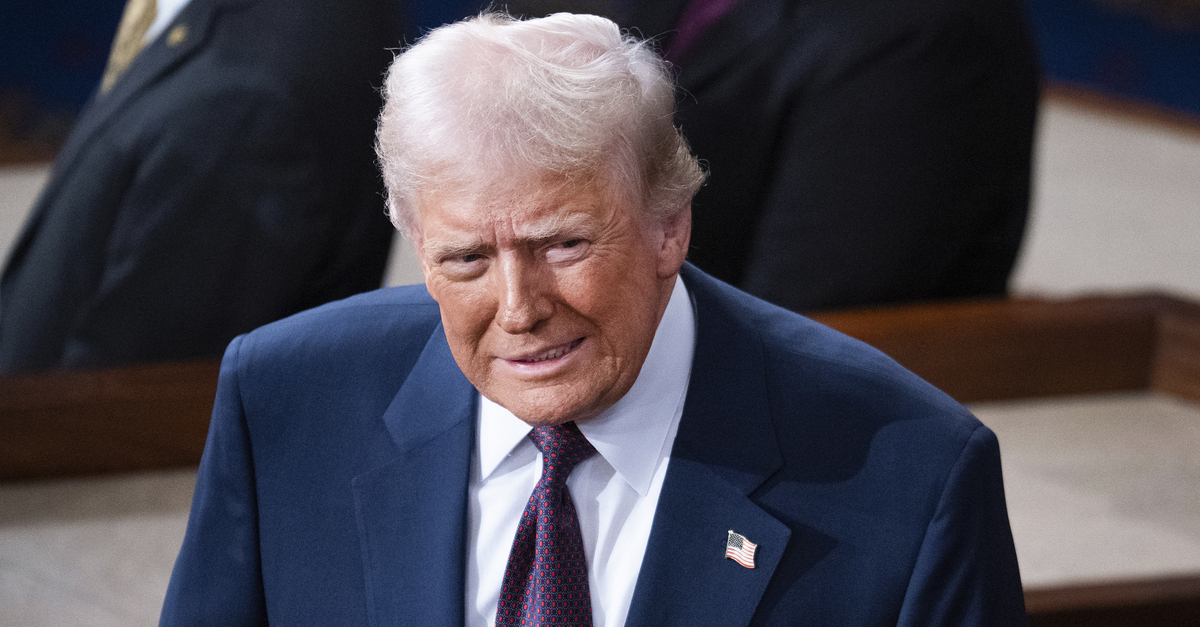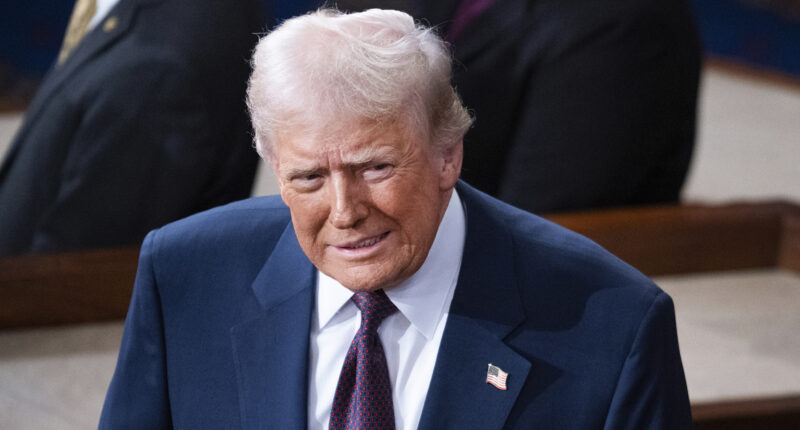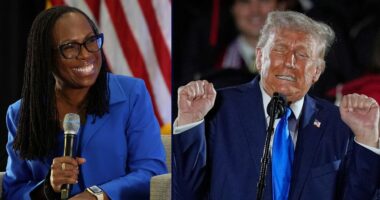
President Donald Trump is seen arriving to deliver his address to a joint session of Congress in the House Chamber of the U.S. Capitol on Tuesday, March 4, 2025 in the United States.
A hearing on the Trump administration’s attempts to dismantle public sector unions showcased starkly contrasting perspectives on presidential authority, labor rights, and judicial oversight. The court session held on Wednesday featured arguments from attorneys representing the National Treasury Employees Union (NTEU), the U.S.’s second-largest federal union, and the U.S. Department of Justice.
U.S. District Judge Paul L. Friedman, appointed during the Bill Clinton administration, underscored the significance of the case after the oral arguments were presented. The judge commended the quality of arguments put forth by both the NTEU’s legal representatives and the U.S. Department of Justice.
In the underlying lawsuit, the NTEU is challenging an executive order issued by President Donald Trump that deems more than a dozen agencies exempt from labor law requirements because they have a “primary function” in “intelligence, counterintelligence, investigative, or national security work.” The union claims the order is a thinly-veiled effort to effectuate wider plans to drastically shrink the federal workforce by making it easier to fire workers. The NTEU also says the order amounts to “political retribution” over a series of lawsuits unions have filed challenging various Trump administration policies.
The DOJ, for its part, rubbished the union’s arguments on both jurisdiction and the merits; the government believes such disputes do not belong in the court system at this stage and, for good measure, defended the president’s prerogative with regard to national security.
Wednesday’s hearing offered the parties a chance to make those arguments one final time before the court decides whether or not the new policy will be enjoined in whole, or in part, or not at all.
“Political retribution is the driver,” the union’s attorney insisted. “This court shouldn’t sanction that type of unconstitutional executive action.”
To hear the NTEU tell it, an accompanying White House fact sheet explaining the order tells the court all it needs to know about the true purpose of the effort to de-unionize the federal government.
“Certain Federal unions have declared war on President Trump’s agenda,” the fact sheet reads. “The largest Federal union describes itself as ‘fighting back’ against Trump. It is widely filing grievances to block Trump policies.”
The judge appeared sympathetic to the union’s reading of this document by grilling the DOJ over the aggressive verbiage.
“This president, which is his wont, sometimes chooses to explain himself,” Friedman said.
The judge went on to call the fact sheet “part of the problem” and said the upshot appears to be that unions who work with the president will be left alone while those who work against him will face consequences.
“How else can you read what he’s done?” Friedman asked.
The government lawyer argued the fact sheet’s reference to the union’s “war on” Trump’s agenda is related to the national security determination.
“Unions at time may obstruct agency management,” she said. “President Trump’s agenda is safeguarding American national security.”
National security, the government believes, is a question-and-jurisdiction-ending off-ramp the judge himself should take.
“The president here is acting with his maximum level of authority under the Constitution,” the DOJ lawyer argued.
She said such power, as delegated by Congress, is “inherently entwined with the president’s assessments of what is required to protect the nation’s authority” and added that it is “really inappropriate for judicial second-guessing and judicial review.”
For now, at least, the judge does have jurisdiction — and had several questions during the hearing.
At the present stage, the plaintiff union is seeking a preliminary injunction that would stop the government from enforcing its eradication of collective bargaining rights for federal workers. And such a sea change, the union says, has exacted vast harm and will continue to do so.
The Trump administration insists the union is overstating the damage — terming the alleged harms speculative in nature.
The judge appeared to lean toward the NTEU on this point.
“Is it really speculative that they’re going to lose lots of dues in the meantime and lots of members?” the judge asked.
In response, the DOJ lawyer said the union might very well win — if it filed its dispute with the Federal Labor Relations Authority (FLRA), which is where the government believes the case should be handled.
The court was not convinced; the judge wondered whether “there is really any recourse” under the FLRA and suggested the best bet for any corrective action under the circumstances would, in fact, be the federal courts.
The judge seemed particularly askance of the Trump administration policy when he asked the government’s lawyer what incentive there would be to join a union if its members cannot collectively bargain.
The DOJ attorney replied that unions offer many benefits to members beyond their ability to collectively bargain. She noted the NTEU continues to represent some 70,000 employees in agencies not covered by the anti-collective bargaining executive order.
“The federal government is extremely large,” the DOJ lawyer said.
“It’s getting smaller,” the judge quickly shot back.
“That’s true,” the DOJ lawyer acknowledged.
In rebuttal, the union’s attorney heaped scorn on those answers.
“There’s simply nothing there,” he told the court. “[The Trump administration] is taking away the very reason people pay dues to us. That’s not a credible argument. We are losing more than $2 million per month.”
The NTEU’s lawyer said that if the executive order stands, the union will lose two-thirds of its workers and that already agencies are ignoring them, won’t come to the bargaining table, won’t meet with union representatives and are ignoring grievances.
The government serially aimed to reconfigure the dispute as being about the broad reach of presidential power, in general, and by dint of the statute that allows the national security determination in the first place.
That statute, the DOJ lawyer said, contains “very broad and capacious language” for the president to “look prospectively at what the country might need.” She argued collective bargaining agreements and dealing with union grievances might “impede” threat responses.
The attorney representing the NTEU addressed the president’s power — and the government’s argument against justiciability — head-on.
“The president has gone far beyond his statutory powers,” the union attorney said. “Judicial review is available.”
Love true crime? Sign up for our newsletter, The Law&Crime Docket, to get the latest real-life crime stories delivered right to your inbox.
The judge ended the hearing with the aforementioned laudatory speech — but held off on issuing any kind of a ruling.
Friedman previewed his upcoming order, however, offering something to both sides: the plaintiffs will not have to file a bond — to the government’s chagrin; joint status reports will be ended — opposite the plaintiff’s request. The judge also signaled he might possibly sever the order by allowing the government to apply the anti-collective bargaining rule to agencies that “clearly” deal with national security.








